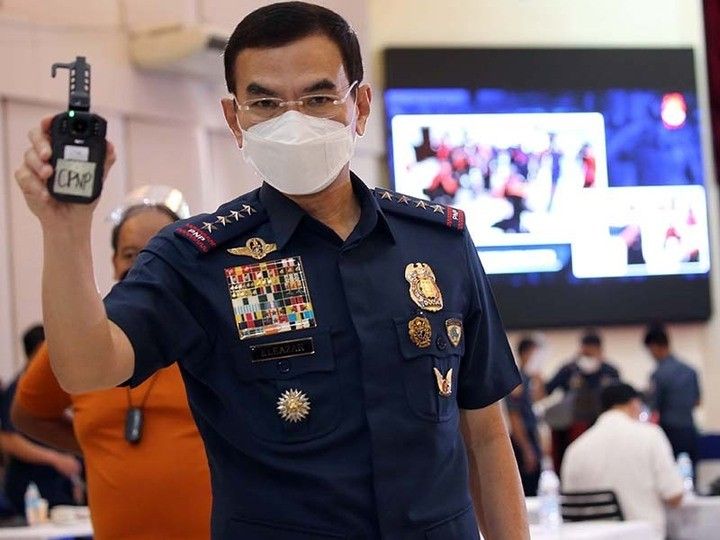PNP says 'will find ways' to follow SC rules on body cameras despite lack of equipment

MANILA, Philippines — The Philippine National Police said Tuesday that it will comply with the Supreme Court's rules governing the use of body-worn cameras but acknowledged it does not have enough cameras for its personnel.
This comes as the court's rules — which require police to be using at least two recording devices in the conduct of search and arrest warrants — officially took effect over the weekend, making the use of body-worn cameras mandatory in the PNP.
In a statement sent to reporters, Police Gen. Guillermo Eleazar, PNP chief, said that the police agency would comply with the rules, adding that body-worn cameras "will be used as far as it is practicable" when it comes to cases of warrantless arrest.
READ: SC rules requiring body cam in police service of warrants take effect
"Our body-worn cameras are not enough but in the spirit of transparency and accountability, I trust that our commanders will find ways to comply with the Supreme Court’s guidelines on the use of body-worn cameras,” he said in mixed Filipino and English.
"[The] PNP has taken the initiative to seek the help of the Supreme Court for clear guidelines on the use of body-worn cameras so there is no reason for us not to follow it."
PNP protocols
Eleazar said the PNP's Directorate for Operations issued a memo containing the general protocols for the use of the cameras on Monday.
The memorandum says that the gadgets are not to be turned off at any point during the execution of a search and arrest warrant or a warrantless arrest.
“[It] also requires police operatives to, upon return of warrant, submit a copy of the video to the court along with an affidavit attesting to the facts and authenticity of the recording,” Eleazar said.
"It also states that operatives must explain to the court in case they do not comply with the requirement to use BWC or [Alternative Recording Device] in their operations."
The PNP chief said that Enhanced Operational Guidelines and Policies on the use of BWCs and ARDs "will soon be disseminated to all police offices and units so all police personnel will be guided accordingly on the proper utilization of the devices."
READ: PNP calls Ateneo study 'unfair', says cops have no new powers in 'drug war'
Optimism that bodycams can curb abuse
At a press conference in Zamboanga City on Tuesday, Eleazar said he was optimistic that the implementation of body cameras would stem the cases of abuse and evidence-planting by police.
"It's a big help because it will document what we are doing...These will professionalize the PNP knowing our police are aware that everything they do should be according to protocol because someone is watching. This doesn't just benefit us, but everyone as well."
Eleazar said the rules were already "being implemented now" but added that there were "issues" that the PNP had asked the Supreme Court for clarification on.
He was careful to add that it would also save the police from what he claimed were false accusations.
"This is not only for the protection of the rights of our countrymen but also the protection of our ranks against misconceptions and allegations in the operations we conduct," he said.
READ: PNP welcomes probe into arrest of activist but denies law is being weaponized
The police chief has long touted the body cameras as the answer to questions over the PNP's accountability, saying they can help in "addressing doubts over legitimate operations."
Over the coronavirus pandemic, the PNP has been criticized for its raids and killings of progressive leaders and its narrative that dead suspects forced the hand of responding officers by violently resisting arrest.
Rights groups and global investigative panels have also found that police-linked killings under the Duterte administration's so-called war on drugs also increased under quarantine.
A review led by Justice Secretary Menardo Guevarra has cast doubt on the narrative as it found that weapons recovered from those killed in the operations were in many cases not examined to verify the "nanlaban" narrative.
- Latest
- Trending































